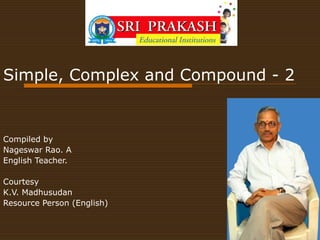
Simple, complex and compound 2
- 1. Simple, Complex and Compound - 2 Compiled by Nageswar Rao. A English Teacher. Courtesy K.V. Madhusudan Resource Person (English)
- 2. enough to 1. He is very strong. He is strong enough to lift any 2. He can lift any weight. weight. 1. The boy was very clever. The boy was clever enough to solve 2. He could solve any any puzzle. puzzle.
- 3. very – so / therefore 1. He is very strong. He is very strong, so he can lift any 2. He can lift any weight. weight. 1. The boy was very clever. The boy was very clever, so he could 2. He could solve any solve any puzzle. puzzle.
- 4. so - that 1. He is very strong. He is so strong that he can lift any 2. He can lift any weight. weight. 1. The boy was very clever. The boy was so clever that he could 2. He could solve any solve any puzzle. puzzle.
- 5. enough to very – so/therefore so - that 1. He is strong enough 1. He is very strong, so 1. The boy is so to lift any weight. he can lift any weight. strong that he can lift any weight. 2. The boy 2. The boy was so 2. The boy was clever was very clever, so he clever that he could enough to solve could solve any puzzle. solve any puzzle. any puzzle.
